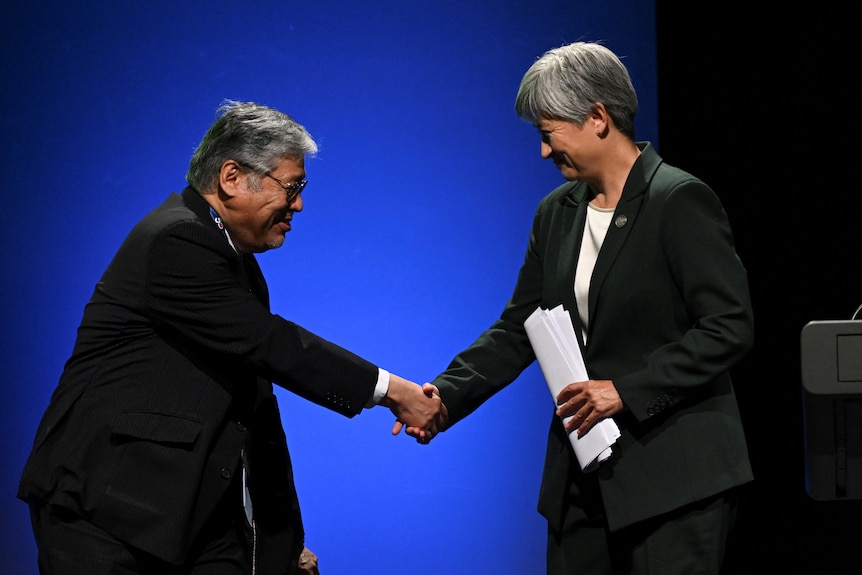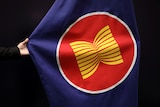Addressing South China Sea Tensions
- Foreign Minister Penny Wong emphasizes the severity of defense threats faced by Indo-Pacific and South-East Asian countries.
- Australia expresses concerns over Beijing’s increasing militarization of the South China Sea.
- Australia takes action by allocating $286.5 million for ASEAN projects, particularly focusing on maritime security.
During the Maritime Cooperation Forum in Melbourne, Foreign Minister Penny Wong stresses the urgent need for new diplomatic and legal mechanisms to prevent potential catastrophic conflicts arising from escalating tensions in the South China Sea and the Taiwan Strait.
These remarks coincide with Prime Minister Anthony Albanese hosting nine South-East Asian leaders for the ASEAN-Australia summit in Melbourne, attracting a multitude of officials and business leaders.
Australia, while actively seeking to strengthen business and investment ties with the region, remains apprehensive about Beijing’s actions in the South China Sea and the growing hostilities between China and the Philippines in disputed waters.
Despite a significant international ruling in 2016 rejecting Beijing’s claims over much of the contested sea, China continues to disregard its validity.
Recently, Philippines President Ferdinand Marcos Jr affirmed to the Australian parliament that he would not compromise on his country’s territorial claims in the South China Sea.

In a speech at the Maritime Cooperation Forum, Penny Wong raised concerns about “provocative and coercive actions” in the South China Sea, without directly naming China. She emphasized the need for adherence to international law, particularly the UN Convention on the Law of the Sea, to maintain order in the region. Wong highlighted destabilizing behaviors such as unsafe conduct at sea, in the air, and the militarization of disputed features.
While addressing the ASEAN Australia summit, Philippines Foreign Minister Enrique Manalo expressed that China had been “harassing” his country. He stressed the importance of seeking a peaceful resolution to the ongoing disputes in the South China Sea. Other South-East Asian nations with overlapping claims have adopted a more cautious stance in dealing with the situation.
Senator Wong underscored the expansion of military power in the region but pointed out the lack of concrete mechanisms to prevent military conflicts. She called for the establishment of a new “preventive architecture” to reduce the risk of conflicts arising from miscalculations or misunderstandings. Wong’s message emphasized the significance of ASEAN in upholding maritime norms and the Law of the Sea.
Jennifer Parker, an expert associate at the ANU’s National Security College, highlighted the importance of ASEAN’s role in addressing South China Sea tensions. She noted that ASEAN’s silence on China’s actions could affect its credibility in maritime security matters. Wong’s speech, although not directly mentioning China, conveyed a clear message about the challenges in the region.
Additionally, Senator Wong announced initiatives to enhance Australia’s presence in South-East Asia, including increased funding for maritime partnerships and resilience programs in the Mekong region. The efforts aim to strengthen cooperation and stability in the region. Moreover, Australian Prime Minister Albanese signed agreements with Malaysian counterpart Anwar Ibrahim to bolster collaboration in education, cyber security, and maritime security.
During discussions on the Gaza conflict at the summit, ASEAN and Australian leaders expressed concerns about the humanitarian crisis and instability in the region. They emphasized the importance of a ceasefire and providing humanitarian aid to alleviate the situation. Malaysian Prime Minister Anwar Ibrahim reiterated the need for maintaining ties with various countries, including China, without compromising Malaysia’s independence.
In conclusion, the discussions at the summit highlighted the complexities of managing South China Sea tensions and addressing global humanitarian crises like the situation in Gaza. Leaders emphasized the importance of diplomacy, cooperation, and upholding international norms to ensure peace and stability in the region.
South China Sea Tensions: Explore More Stories
Albanese’s Readiness to Engage with South-East Asia’s Key Players Amid South China Sea Tensions

Warning from Federal MP to Cambodian Leaders Regarding Intimidation of Critics Before ASEAN-Australia Summit
A Federal Member of Parliament has issued a caution to the leaders of Cambodia, urging them not to engage in intimidation tactics against dissenting voices in the lead-up to the ASEAN-Australia summit. This warning comes amidst escalating tensions in the South China Sea region.

Please check out more information about South China Sea tensions on the following topics: Asia, Australia, China, Defence and National Security, Foreign Affairs, International Law, Pacific, Philippines, Territorial Disputes, and World Politics. For further details, please visit our site 60time.com. Don’t forget to follow us on social media at [email protected].


